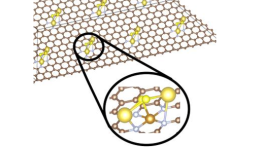Cooper Union Engineering Students Participate in 10th Virtual Winter School on Computational Chemistry
POSTED ON: February 21, 2024

Image of a Simulation of sodium polysulfide attached to a FeN4/graphene battery terminal surface.
During the week of January 29, nine Cooper Union engineering students participated in the 10th Virtual Winter School on Computational Chemistry (VWSCC) with over 1,200 students and researchers from across the globe. The students learned how computational quantum mechanics is used to study the structures, reactions, and applications of chemical compounds, biomolecules, and materials.
The VWSCC is held online, and its organizing committee is based in the European Union. This year the School of Engineering received sponsorship from Cooper Union, facilitated by a generous contribution from chemical engineering alumnus Alan Fortier ChE’79, alongside support from Universidad de Salamanca (Spain). The main goal of the VWSCC is to provide easy-to-follow lectures covering the latest research to students worldwide, making scientific exploration accessible to everyone regardless of their circumstances. This valuable opportunity is provided to all participants for free.
Robert Q. Topper, professor of chemistry, is a member of the VWSCC organizing team and steered several of the talks and sessions. Alongside the eleven lectures delivered by globally renowned computational chemistry experts, participants also had the opportunity to attend two complimentary workshops sponsored by Q-Chem and BigDFT, two major providers of computational chemistry software.
Furthermore, there were four student presentation sessions where participants were encouraged to create concise single-figure presentations and deliver five-minute "elevator pitches" to describe their work. Among the presenters were Cooper Union students Ubaidullah Hassan ChE’25 and Andrew Kim ChE’25, along with high school student William Wang from The Lawrenceville School. They showcased research projects conducted under the guidance of Professor Topper. The presentations covered a range of topics, including predicting and analyzing the decomposition and growth of atmospheric nanoparticles, designing systems to minimize degradation of battery electrodes, and developing precise interatomic force models for Monte Carlo simulations.
Cooper students who participated in the VWSCC included Abduhla Ali EE’25, Nicholas Louie ChE’24, Jeremy Lugo ChE’25, Fayad Sarker ME’24, Evelyn Schwartsman ChE’25, Arsha Uthairungsri ChE’25, Jinxing Yiu ChE’27, Ubaidullah Hassan ChE’25, and Andrew Kim ChE’25.
Student reflections:
"Even though I have listened to recorded classes from VWSCC before to help with my research, this was my first time participating in the VWSCC as an SFP presenter. The brevity of the presentations appealed to me, as I was able to learn about more than a dozen computational research projects being conducted on everything from massive biomolecules to nanoparticle clusters. The short time limit required me to be even more selective with my words and to get to the point with the core of my research…I think students in their freshmen and sophomore years would benefit from being introduced to computational chemistry as an accessible tool for a variety of research topics they might have in mind." – Andrew Kim ChE’25
"It was a very valuable and positive experience participating in the 2024 VWSCC. It was a new and fun experience showcasing my work in a concise single figure presentation. This presentation format made it possible to get exposed to lots of different research in the field and see a general overview of the types of things people are doing. Additionally, since I want to pursue related work in my future research career, it was useful listening to the various talks on how computational chemistry is being applied in different fields like material science and biochemistry." – Ubaidullah Hassan ChE’25
"It was interesting hearing researchers speak about their work in computational physics and chemistry. I also enjoyed the workshop and presentation about BigDFT, a very large scale (and open source!) software package." – Abduhla Ali EE’25
The 10th VWSCC was led by Rebecca Ingle from University College London, UK, serving as the chairperson. Assisting her were organizing team members: Cate Anstöter from the University of York, UK; Dominique Buyens from the University of Pretoria, South Africa; Henrique Castro from Universidade Federal do Rio Grande do Sul, Brazil; Milica Feldt from Leibnitz Institute for Catalysis, Germany; Sandra Gomez from Universidad de Salamanca, Spain; Lea Ibele from Institute Chimie-Physique at University Paris-Saclay/CNRS, France; Julianna Olah from Budapest University of Technology and Economics, Hungary; and Robert Topper from The Cooper Union.




